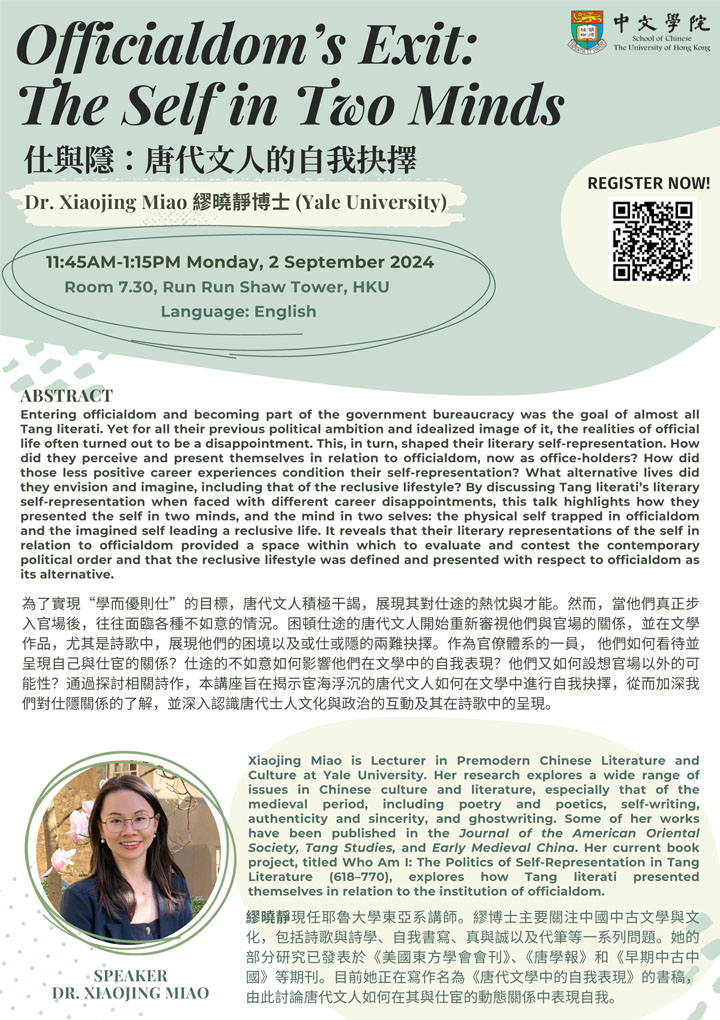Officialdom’s Exit: The Self in Two Minds 仕與隱:唐代文人的自我抉擇

School of Chinese Seminar
Officialdom’s Exit: The Self in Two Minds
仕與隱:唐代文人的自我抉擇
Dr. Miao Xiaojing 繆曉靜博士 (Yale University)
Date: September 2, 2024 (Monday)
Time: 11:45 - 1:15 pm
Venue: Room 7.30, Run Run Shaw Tower, Centennial Campus, HKU
Language: English
Registration is FULL
Abstract:
Entering officialdom and becoming part of the government bureaucracy was the goal of almost all Tang literati. Yet for all their previous political ambition and idealized image of it, the realities of official life often turned out to be a disappointment. This, in turn, shaped their literary self-representation. How did they perceive and present themselves in relation to officialdom, now as office-holders? How did those less positive career experiences condition their self-representation? What alternative lives did they envision and imagine, including that of the reclusive lifestyle? By discussing Tang literati’s literary self-representation when faced with different career disappointments, this talk highlights how they presented the self in two minds, and the mind in two selves: the physical self trapped in officialdom and the imagined self leading a reclusive life. It reveals that their literary representations of the self in relation to officialdom provided a space within which to evaluate and contest the contemporary political order and that the reclusive lifestyle was defined and presented with respect to officialdom as its alternative.
為了實現“學而優則仕”的目標,唐代文人積極干謁,展現其對仕途的熱忱與才能。然而,當他們真正步入官場後,往往面臨各種不如意的情況。困頓仕途的唐代文人開始重新審視他們與官場的關係,並在文學作品,尤其是詩歌中,展現他們的困境以及或仕或隱的兩難抉擇。作為官僚體系的一員, 他們如何看待並呈現自己與仕宦的關係?仕途的不如意如何影響他們在文學中的自我表現?他們又如何設想官場以外的可能性?通過探討相關詩作,本講座旨在揭示宦海浮沉的唐代文人如何在文學中進行自我抉擇,從而加深我們對仕隱關係的了解,並深入認識唐代士人文化與政治的互動及其在詩歌中的呈現。
About the Speaker:
Xiaojing Miao is Lecturer in Premodern Chinese Literature and Culture at Yale University. Her research explores a wide range of issues in Chinese culture and literature, especially that of the medieval period, including poetry and poetics, self-writing, authenticity and sincerity, and ghostwriting. Some of her works have been published in the Journal of the American Oriental Society, Tang Studies, and Early Medieval China. Her current book project, titled Who Am I: The Politics of Self-Representation in Tang Literature (618–770), explores how Tang literati presented themselves in relation to the institution of officialdom.
繆曉靜現任耶魯大學東亞系講師。繆博士主要關注中國中古文學與文化,包括詩歌與詩學、自我書寫、真與誠以及代筆等一系列問題。她的部分研究已發表於《美國東方學會會刊》、《唐學報》和《早期中古中國》等期刊。目前她正在寫作名為《唐代文學中的自我表現》的書稿,由此討論唐代文人如何在其與仕宦的動態關係中表現自我。
All are welcome








